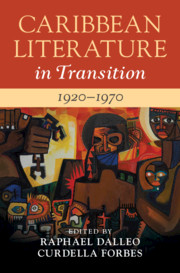Book contents
- Caribbean Literature in Transition, 1920–1970
- Caribbean Literature in Transition
- Caribbean Literature in Transition, 1920–1970
- Copyright page
- Contents
- Figure
- Contributors
- Introduction
- Part I Literary and Generic Transitions
- Part II Cultural and Political Transitions
- Chapter 7 Debating Language
- Chapter 8 Periodical Culture
- Chapter 9 Decolonizing Education
- Chapter 10 Imaginaries of Citizenship and State
- Chapter 11 Postcolonial Stirrings
- Part III The Caribbean Region in Transition
- Part IV Critical Transitions
- Bibliography
- Index
Chapter 10 - Imaginaries of Citizenship and State
from Part II - Cultural and Political Transitions
Published online by Cambridge University Press: 16 December 2020
- Caribbean Literature in Transition, 1920–1970
- Caribbean Literature in Transition
- Caribbean Literature in Transition, 1920–1970
- Copyright page
- Contents
- Figure
- Contributors
- Introduction
- Part I Literary and Generic Transitions
- Part II Cultural and Political Transitions
- Chapter 7 Debating Language
- Chapter 8 Periodical Culture
- Chapter 9 Decolonizing Education
- Chapter 10 Imaginaries of Citizenship and State
- Chapter 11 Postcolonial Stirrings
- Part III The Caribbean Region in Transition
- Part IV Critical Transitions
- Bibliography
- Index
Summary
Caribbean literature from the mid twentieth century is often centrally concerned with nationalism and independence. But literature from this period, both within the anglophone Caribbean and across the pan-Caribbean region, also responded to a series of other – sometimes complementary, sometimes competing – political projects. This chapter looks at how literature represented and addressed institutional changes such as the rise of trade unions, the development of political parties and constitutional changes in the anglophone Caribbean; the advent of DOM status in the French Caribbean; Puerto Rico’s anomalous status as an Associated Free State of the USA; Cuba’s annexation into the US economy; and the Cuban Revolution. Writers sought to document these changes, to mobilize social movements, and to imagine new political possibilities. In the process, they negotiated the push and pull between literary commitment and artistic freedom. For a variety of reasons, anglophone literary figures were often drawn to West Indian federation. Even after federation failed, writers still frequently couched their nationalism in regional terms and looked to various pan-Caribbean inspirations for a larger vision of citizenship and community. This chapter will examine how writers from the 1940s, 1950s, and 1960s sought to support, critique, and navigate the political transformations of the era.
Keywords
- Type
- Chapter
- Information
- Caribbean Literature in Transition, 1920–1970 , pp. 162 - 175Publisher: Cambridge University PressPrint publication year: 2021

